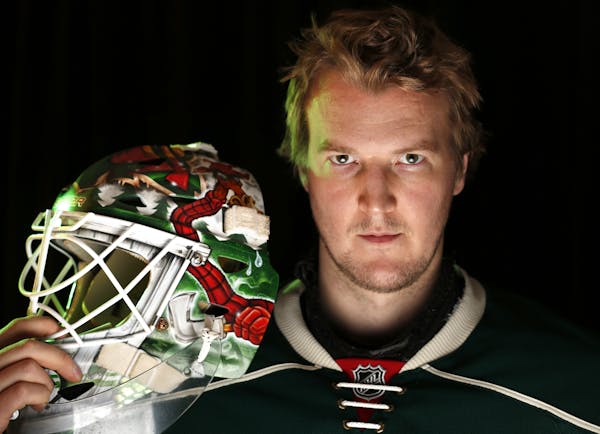SUNRISE, FLA. – As the Wild looks ahead to next season, the team seems determined not to be defined by the way last season ended.
A four-game exit from the second round at the hands of the Chicago Blackhawks appeared to highlight issues that would need to be addressed, perhaps in the draft — which ended here Saturday — or in a trade, or in free agency.
But General Manager Chuck Fletcher has repeated that he doesn't want the Chicago sweep to cause the team to sway from the success it had in the second half of the season and in a first-round victory over St. Louis.
In fact, Fletcher's key offseason signing will be the one that came Saturday when goalie Devan Dubnyk agreed to return to the team, getting a front-loaded six-year, $26 million deal. Dubynk, 29, won the Masterton Trophy, was a finalist for the Vezina (best goalie) and finished fourth in the MVP voting after being the key to the Wild's playoff surge after he arrived in a January trade.
The longer-term contract gives Fletcher a bit of a cushion heading into this week's free agency. Dubnyk's $4.33 million cap hit makes him the 20th-highest-paid goalie in the league; he'll get $5 million in each of the first four seasons, then $3.5 million and $2.5 million the last two seasons.
"The cap number will work very well for us, and the term is what he was hoping to get," said Fletcher. "That's the compromises you make."
The goalie question was most important heading into next season. The franchise has had no stability for years in net.
"Believe me, we've analyzed this to death," Fletcher said. "We've looked at it every which way, and we're very comfortable with the analytics behind this signing."
Dubnyk understood how limited the Wild's salary-cap situation was, particularly this summer. He wanted to stay and cooperated.
Center Mikael Granlund, center Erik Haula and defenseman Christian Folin are unsigned restricted free agents, and the Wild still must fill out the rest of its roster. It has less than $8.5 million of cap space to play with this summer, and that doesn't include the room Fletcher will leave for injuries and in-season adjustments.
Roughly $3 million of that likely goes to Granlund.
Draft classes for playoff teams take years to pay off. Friday night's first round produced center Joel Eriksson Ek, who will remain in Sweden. Last year's first-rounder, winger Alex Tuch, is at Boston College. Only three players taken since 2011 (Jonas Brodin, Tyler Graovac and Matt Dumba) have played for the Wild.
So barring a trade to unload salary, the Wild's free-agent moves, beginning this week, will mostly be depth moves.
The Wild could re-sign Ryan Carter, who played well before a second-half injury. It could sign a player like St. Louis Blues energy-bug Chris Porter, one of star winger Zach Parise's close friends. And the door is wide open for Jordan Schroeder, who was up and down between the Wild and Iowa, to make the team.
On Wednesday, the signing of former Gophers standout defenseman Mike Reilly will be official. The Blackhawks have eliminated the Wild the past three seasons in the playoffs, but the Wild beat Chicago in the Reilly sweepstakes. Reilly will have a chance to make the team, although the Wild probably needs to sign one or two veteran blue-liners. Re-signing Jordan Leopold makes sense; he wouldn't cost much, he played well after coming over from Columbus and he could be a mentor for youngsters.
"The way we won as a group, it was important to keep that group together," Dubnyk said. "There was no point in trying to break that group apart just for something a little extra."
So the Wild will have very familiar personnel. Fans might want more changes, but Fletcher said he believes in the Wild veterans and the team's 12 players 25 and younger — "Our young core is as strong as most teams in this league," he said.
That doesn't mean he wasn't incredibly frustrated by the Blackhawks' sweep.
"I've never seen a team that turned more pucks over than we did," Fletcher said. "We played the opposite of the way we're supposed to play. It was like we were finally going to show them, and the ironic thing is Chicago played against us the way we were supposed to play against them.
"They chipped pucks in deep and they played a more patient, cautious game and waited to counterattack and we were the team attacking. I don't understand the mentality we had in that series. It wasn't coaching. Our players just have to be better. We were very excited to play them, not out of arrogance, but it was like, 'We're going to take all the lessons we've learned and prove to them and ourselves we're a different team.'
"It'll be rectified. We're a good team."
Michael Russo mrusso@startribune.com
